by Lisa Cooke | Jul 8, 2015
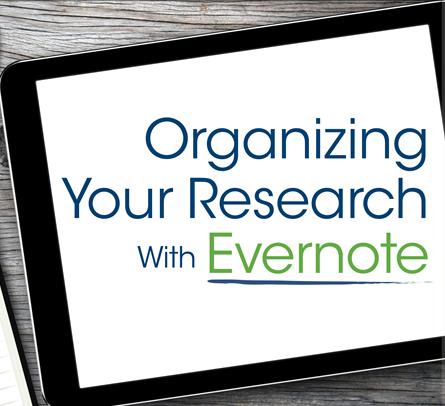 Using Evernote for genealogy will make you a more efficient and effective researcher.
Using Evernote for genealogy will make you a more efficient and effective researcher.
Genealogists all over the world are harnessing the power of Evernote to organize their family history research. This free software (and website application) can bring all your research materials (text notes, photos and images from mobile devices, video, audio interviews, web content and URLs) together in one place.
Then it goes even further by making all the text items keyword-searchable. So you can much more easily locate that one little piece of information you recall only as “that bit about the fire station he worked for.”
Better yet, Evernote goes with you. With the Evernote software and companion app, your genealogy notes will be accessible from and fully-synced across all your computing devices. Sigh! It’s wonderful!
Here’s how to get started
1. Download the free Evernote software here.
2. Create your free or premium Evernote account. (Click here to learn more about Evernote account options.)
3. Go to your Account page and make note of your unique Evernote email address. (Help>Go to My Account Page>Account Summary and scroll down to “Email Notes to.”)
4. Download the free Evernote web clipper for your web browser.
5. Download the free Evernote app from the App Store or Google Play and sign in to your account.
Now you’re ready to use Evernote to collect your research content and source citation information!
Here are 5 ways to add content to Evernote
1. The Web Clipper: Pull data from websites with the handy web clipper and Evernote will often automatically capture information about the site you got it from.
2. Drag and Drop: Images, scanned documents and other multimedia content can be dropped right into new or existing notes.
3. Smartphone and Tablet: Snap a photo of a record, tombstone or any other genealogical item. (I like to do a quick photo “Edit” cleanup to get it in the best shape possible). Tap the Share button and send it to Evernote.
4. Email Content: Use your unique Evernote email address to send content from anywhere to your account.
5. Good Old Typing: Click “New Note” and start typing. You can always add other content including merging notes together.
Resources for Success
There’s so much demand for learning to use Evernote for genealogy that I’ve created a variety of helpful resources in video, audio, print and online formats (because everyone learns differently!).
FREE YouTube Video Series: Evernote for Genealogy
I’ve posted two videos so far on my free YouTube series:
Evernote for Genealogy Quick Reference Guide
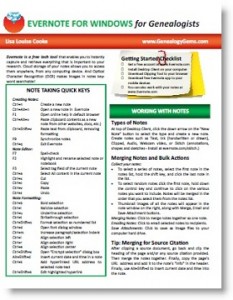 My laminated reference guide is super handy for every day support! This guide includes:
My laminated reference guide is super handy for every day support! This guide includes:
- A Getting Started Checklist
- Quick Keystrokes
- Getting the Most Out of Clipping
- Maneuvering the Desktop Client
- Genealogical Organization
- Little-Known Search Strategies
- Specialized Genealogy Focused Techniques
- Comparison of Evernote Pricing Tiers
The guide is available for both Windows and Mac users, in both print and digital download format. Click below to view:
The Ultimate Evernote for Genealogy Education
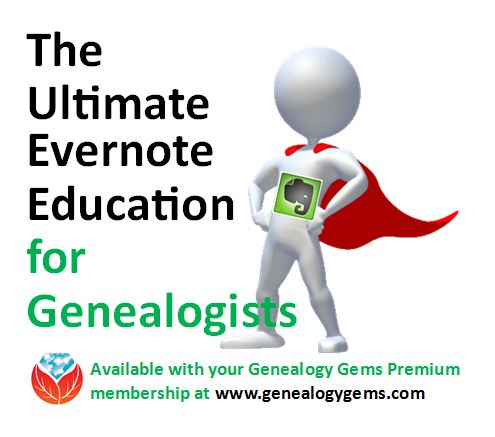 Genealogy Gems website Premium members have a full-year’s access to my popular in-depth video classes, which include The Ultimate Evernote for Genealogy Education video series. This series includes the following full-length and mini-series classes:
Genealogy Gems website Premium members have a full-year’s access to my popular in-depth video classes, which include The Ultimate Evernote for Genealogy Education video series. This series includes the following full-length and mini-series classes:
 Keep up on all my latest Evernote news and Q&As!
Keep up on all my latest Evernote news and Q&As!
Click here to read my Evernote blog posts.
Sign up for my free email newsletter (that sign-up comes with a free bonus e-book!).
Who else do you know who would benefit from getting organized? I hope you’ll share this page with your friends, relatives, family history buddies and fellow gen society members using the share icons below. Thanks!
by Lisa Cooke | Jul 28, 2017 | 01 What's New, Australian, Canadian, FamilySearch, Irish, Italian, Records & databases
Free genealogy records, newly available online, may be able to take you around your ancestor’s world! This week’s record destinations include Australia, Belgium, Brazil, Bolivia, Canada, Chile, Dominican Republic, France, Italy, Netherlands, Nicaragua, Russia, and South Africa.

Civil registration records–key genealogical resources–from several countries are among the free new family history records online in recent days and weeks. But you’ll also find probate records, church records, military personnel records, and even a digital archive meant to preserve ancient aboriginal languages. Which might mention your ancestors?
Argentina
Over 100,000 indexed names have been added to FamilySearch’s free collection, Argentina, Entre Ríos, Catholic Church Records, 1764-1983. According to a collection description, it includes “baptisms, confirmations, marriages and burials for cities in the province of Entre Ríos.”
Australia
An exciting new Australian website houses a digital archive of Aboriginal and Torres Strait Islander language materials. It includes texts, audio, video, and ebooks about Australia’s First Nations languages. The hope of the site is to be a digital repository for gathering, preserving, and sharing materials that in effect preserve these languages and revitalize their use. The site managers will continue to work with partners to bring more content to the site. Click here to read more about the site’s launch, and click here to access it directly.
Belgium
Two free Belgian civil registration collections at FamilySearch.org have been updated:
Both of these collections are comprised of civil registration of births, marriages, and deaths from the Belgium National Archives, as well as marriage proclamations, marriage supplements, and some original indexes. Additional images will be added as they become available.
Brazil
Several free Brazilian genealogy records collections have been updated at FamilySearch.org. Among them are the following:
- Pernambuco, Civil Registration, 1804-2014 (more than 300,000 newly indexed records)
- Piauí, Civil Registration, 1875-2013 (nearly 150,000 newly indexed records)
- Brazil, São Paulo, Immigration Cards, 1902-1980 (over 20,000 newly indexed records)
Bolivia
Over 300,000 indexed names have been added to FamilySearch.org’s enormous free collection of Bolivia Catholic Church Records, 1566-1996. The collection hosts over 1.5 million digitized images of Catholic Church records created by parishes in Bolivia. “These records include: baptisms, confirmations, marriages, pre-marriage investigations, deaths, indexes and other records. Some of these records have been indexed and are searchable as part of this collection. Additional indexed records will be published as they become available.”
Canada
Library and Archives Canada continues to update its free Personnel Records of the First World War database. So far, the database includes “digitized files for many individuals of the Canadian Expeditionary Force and the Royal Newfoundland Regiment and Newfoundland Forestry Corps (courtesy of the Rooms Provincial Archives).”
Newly digitized CEF files are added to the references every two weeks, states the collection’s landing page. To date, over 461,000 of an expected 640,000 files have been added. “Library and Archives Canada is digitizing the service files systematically, from box 1 to box 10686, which roughly corresponds to alphabetical order,” explains a blog post. “Please note that over the years, the content of some boxes has had to be moved and, you might find that the file you want, with a surname that is supposed to have been digitized, is now located in another box that has not yet been digitized.”
Chile
FamilySearch.org has updated its free collection, Chile Civil Registration, 1885-1903. These include “births, marriages, and deaths for various localities in Chile from 1885 to 1903. For a complete list of all the provincias and comunas included in this collection, see the Provinces of Chile – Civil Registration coverage table. Only records from a few localities have been indexed. More records and images will be added as they become available.” Need help reading these? FamilySearch suggests using this Spanish Genealogical Word List, which also links to other translation tools.
Dominican Republic
Over 175,00 indexed names have been added to FamilySearch’s free collection, Dominican Republic Civil Registration, 1801-2010. Spanning over 200 years, the collection includes images of births, marriages, and deaths as well as some divorces and indexes. “Some of these records have been indexed and are searchable as part of this collection,” states the collection description. “Additional images and indexed records will be published as they become available. These records were obtained from public access sources in the Dominican Republic.”
France
FamilySearch has updated its collection of indexed Catholic parish record images for Coutances et d’Avranche Diocese, 1533-1894. Baptisms, marriages, and burials are all included. “Parishes within this diocese are within the boundaries of the department of Manche,” states a collection description. “French commission for Informatics and Liberties (CNIL) does not allow publication of sensitive data below 150 years.”
Italy
FamilySearch continues to publish more Italian civil registration records! These are some of the latest:
Netherlands
Just shy of a million records have been added recently to FamilySearch’s free collection, Netherlands, Archival Indexes, Miscellaneous Records. “Archives around the Netherlands have contributed indexes which cover many record sources, such as civil registration, church records, emigration lists, military registers, and land and tax records,” says the collection description. “These records cover events like birth, marriage, death, burial, emigration and immigration, military enrollment and more. These indexes were originally collected, combined and published by OpenArchives.”
Nicaragua
There are now over two century’s worth of records in the free FamilySearch collection, Nicaragua Civil Registration, 1809-2013. It includes “births, marriages, deaths, and other records created by civil registration offices in various departments of Nicaragua.” Civil registration in Nicaragua didn’t begin until 1879, and it appears that most records in this collection date from that year or later.
Paraguay
Nearly 125,000 browse-only images have been added to FamilySearch.org’s free collection, Paraguay Miscellaneous Records, 1509-1977. According to the site, “These records include two complete collections: Sección Nueva Encuadernación (Rebinding Section) and Sección Propiedades y Testamentos (Properties and Wills Section). Copies of the original records are housed at the Archivo Nacional in Asunción, Paraguay. The “Propiedades y Testamentos” section can give a brief look at the personal wealth of clerics, economic bases of resident foreigners in Paraguay, or the fortunes of a given family over a period of time.”
Russia
FamilySearch.org has updated its free collection, Russia, Samara Church Books, 1779-1923. It includes “images and partial index to records of births and baptisms, marriages, deaths and burials performed by priests of the Russian Orthodox Church in the province of Samara. These records were acquired from the state archive in that province.” Another brief statement in the collection description illustrates the incremental and ongoing nature of record additions to FamilySearch: “Currently this collection is 4% complete. Additional records will be added as they are completed.”
South Africa
Over 40,000 indexed records have been added to the free FamilySearch.org collection, South Africa, Transvaal, Probate Records from the Master of the Supreme Court, 1869-1958. The records are described simply as “probate records from the Master of the Supreme Court, Transvaal, South Africa. Original records are located in the Transvaal Archives Depot, Pretoria, Republic of South Africa.
Spotlight on probate records
 Probate records detailed the final settling of our ancestors’ financial assets. They often contain rich genealogical information and interesting insights into a person’s life. They are among the many records you might find at courthouses and government archives. More U.S. probate records are coming online (click here to learn more), but even if you have to visit a courthouse yourself or hire someone to do it for you, it’s often worth it. Click here to read why.
Probate records detailed the final settling of our ancestors’ financial assets. They often contain rich genealogical information and interesting insights into a person’s life. They are among the many records you might find at courthouses and government archives. More U.S. probate records are coming online (click here to learn more), but even if you have to visit a courthouse yourself or hire someone to do it for you, it’s often worth it. Click here to read why.
Thanks for sharing this post with those who will want to know about these free genealogy records online!

by Lisa Cooke | Nov 9, 2012 | Genealogy Gems Podcast
[iframe src=”http://html5-player.libsyn.com/embed/episode/id/2121515/height/100/width/480/thumbnail/yes” height=”100″ width=”480″ scrolling=”no”]
Today’s gem focuses on a challenge that we all face as family historians – getting organized, archiving all of our stuff, and digitizing materials an d photos. I know that’s biting off a big chunk, but it’s such an important one. And in this episode I’m going to start to break it down for your with the help of the Family Curator, Denise Levenick who has written a book called How to Archive Family Keepsakes. She’s got lots of practical advice to share.
NEWS:
FamilySearch recently announced that their U.S. Immigration and Naturalization Community Project is Half-way to its 2012 Goal of 30 Million Records
In August of this year, FamilySearch announced its next major U.S. community project-U.S. Immigration and Naturalization. The project will create an extensive, free, online collection of U.S. passenger lists, border crossing records, naturalization records, and more-invaluable to genealogy researchers. See what U.S. Immigration and Naturalization projects are currently underway, or check on their status at FamilySearch.org/immigration.
You can join the community of online indexers and arbitrators helping to make passenger lists and naturalization records freely searchable on familysearch.org.
Current and Completed Projects
To view a list of currently available indexing projects, along with their record language and completion percentage, visit the FamilySearch indexing updates page. To learn more about individual projects, view the FamilySearch projects page.
Canadian Military Records
Ancestry.ca has also announced that they have launched some New Canadian Military Records Collections
Read about it on my Blog: Limited Time Free Access to Canadian Military Records, and New Records Online
Google recently announced that Google Maps just got the biggest Street View update ever, doubling the number of special collections and updating over 250,000 miles of roads around the world. Google has increased Street View coverage in Macau, Singapore, Sweden, the U.S., Thailand, Taiwan, Italy, Great Britain, Denmark, Norway and Canada. And they are launching special collections in South Africa, Japan, Spain, France, Brazil and Mexico, among others. .
They’ve also recently updated the Google Earth satellite imagery database. This refresh to the imagery has now been updated for 17 cities and 112 countries/regions. So Google Earth has never been better for genealogy research. And of course if you would like to learn more about what Google Earth can do for you as a genealogist, check out my free YouTube videos which show you what you can learn in Google Earth for Genealogy Video Tutorial Series.
Genealogy Gems Premium Membership Update
I’m happy to let all of you Premium members know that I’ve put together a quick little video that will walk you through the process of setting up your Premium podcast feed in iTunes.You’ll find a link on the premium episodes page once you’ve signed in that will take you to the video and instructions for setting up your Premium iTunes subscription.
I have also added a video recording of one my most popular classes to the Premium Videos collection. It’s called How the Genealogist Can Remember Everything with Evernote.
From Premium Member Kelly: “Thank you so much for your podcast on Evernote. I’ve been on YouTube watching videos about it but they were hard to follow and more advanced or to techie. Your podcast was easy to follow and went over the basics and I really appreciate that. I think I finally ready to try it.”
If you would like to be able to watch the Evernote class from the comfort of your own home please join us as a Genealogy Gems Premium Member which you can do at www.genealogygems.com
MAILBOX:

From Patience: “I have noticed in your podcast, other’s podcasts, blogs, and at workshops I have attended that there is a concern about the next generation. I do understand, but I wanted to share with you my experience in hopes of easing everyone’s worries. I am 23 years old, and let me tell you I stick out like a sore thumb at workshops as I usually am the youngest by at least 30 years. That being said when I started researching I met one of my cousins on ancestry.com, and we really hit it off we have all the same interests and are like long lost twins. For a while, I assumed that she was retired, and much much older than I, but after several emails, I found out she is only two years older than me!!!
I too worry about my generation, but I think after some maturing, most will at least have an appreciation for the past, and everything it has to offer, or at least I hope…But all I know is that there are two very pretty twenty-something girls thousands of miles apart that would rather research and learn that go to parties…so that seems pretty hopeful I think.”
Jennifer Takes the iPad on the Road
“Kudos for turning me on to a nifty iPad shortcut. Your latest book has some tips in the back, which is where, of course, I skipped to after dutifully reading the first three chapters or so. The tips about swiping the comma/exclamation point to create an apostrophe, and the other shortcut for quotation marks, are so great! I will no doubt find many other useful items when I return to reading. Honestly, your books are so full of wonderful information, I have to take a break before my head explodes (not pretty).”
Pat Oxley, a Genealogist on Facebook posted her review of my new book on Facebook last week. “Despite another day of coughing and basically feeling yuk, I bought and downloaded Lisa Louise Cooke‘s new book “Turn your iPad into a Genealogy Powerhouse.” It is FABULOUS! I worked my way through the book, taking notes and then downloaded and played with some of the apps she suggested! Thank you Lisa Louise! I will say it’s a terrific book even if you’re NOT a genealogist. Many of her suggested apps could be applied to many different hobbies and interests. You can buy it through Lulu.com.”

GEM: Interview with author Denise Levenick, The Family Curator
Archiving, organizing and digitizing family treasures is one of the greatest challenges for genealogists. In her book How to Archive Family Keepsakes: Learn How to Preserve Family Photos, Memorabilia and Genealogy Records, Denise Levenick presents a game plan that breaks down the steps and provides a clear picture of the end goal. The worksheets and checklists provide the kind of practical advice I look for in “how to” books. No fluff, just common sense, and usable information that lead to success.
Get your copy of Denise’s book How to Archive Family Keepsakes: Learn How to Preserve Family Photos, Memorabilia and Genealogy Records and start getting organized now!


Denise May Levenick is a writer, researcher, and speaker with a passion for preserving and sharing family treasures of all kinds. She is the author of How to Archive Family Keepsakes and creator of The Family Curator blog http://www.TheFamilyCurator.com, voted one of the 40 Best Genealogy Blogs in 2010 and 2011.
Gem: One More Thing
From Tina in the UK: “Your recent blog post about items found when clearing out a house reminded me of my most significant find in my stepfather’s attic. He died in July 2009 and my mother wanted to clear out and sell their big house and move to a retirement flat to be near the family in Bristol. I should explain that my mother and father divorced when I was a baby and my stepfather was like a father to me. We threw out masses of stuff – he never did, EVER! – but this was mostly correspondence, company reports for all his shares etc which we sifted through without much of note being found. Then, in the attic there were two extraordinary finds:
(1) a box full of the small notebooks he kept from his schooldays till a few years before he died…early ones and especially the ones of his years in the Army in India and Burma…The later notebooks are a record of his expenses – with dates, items and expenses which brought back many memories (eg doll for Tina – bought in New York on holiday in 1958 – I remember it well, it was a sort of pre-Barbie!). Every ice-cream he ever bought us – there was a LOT of ice-cream (he loved it)!
(2) my grandfather’s old attache case – full of letters from my stepfather’s mother between about 1978 and her death in 1993. There were hundreds of them – and yes, I read every single one and they have formed the basis of the story of her life (yes, she also left a small diary, a collection of her own recipes of family favourites, and a very simple family tree), which I am now writing…what VERY little there was seemed to be in answer to some of his questions…It just shows how the smallest things can provide clues.”
Thank you Tina for sharing this – it certainly does remind us that clues can come from anywhere. But it also reminds us of something else – that while it’s wonderful to have our history recorded so it can be remembered, sometimes it’s the smallest things that are remembered most: Like ice cream. I think I’m going to sign off now and take my grandson Davy out for a cone. I hope he remembers it, because I know I will. Who will you invite out for a an ice cream and spend your precious time with today?
Check out this episode
Disclosure: This article contains affiliate links and Genealogy Gems will be compensated if you make a purchase after clicking on these links (at no additional cost to you). Thank you for supporting Genealogy Gems!
by Lisa Cooke | Sep 9, 2016 | 01 What's New, Records & databases
Colonial genealogy records are just the tip of the iceberg in this week’s new and updated genealogical collections. If your roots go back to the early days of the American colonies, you will want to get started in these unique colonial genealogy records. Additionally, some fantastic finds for the United Kingdom and Denmark are also available in this week’s gems.
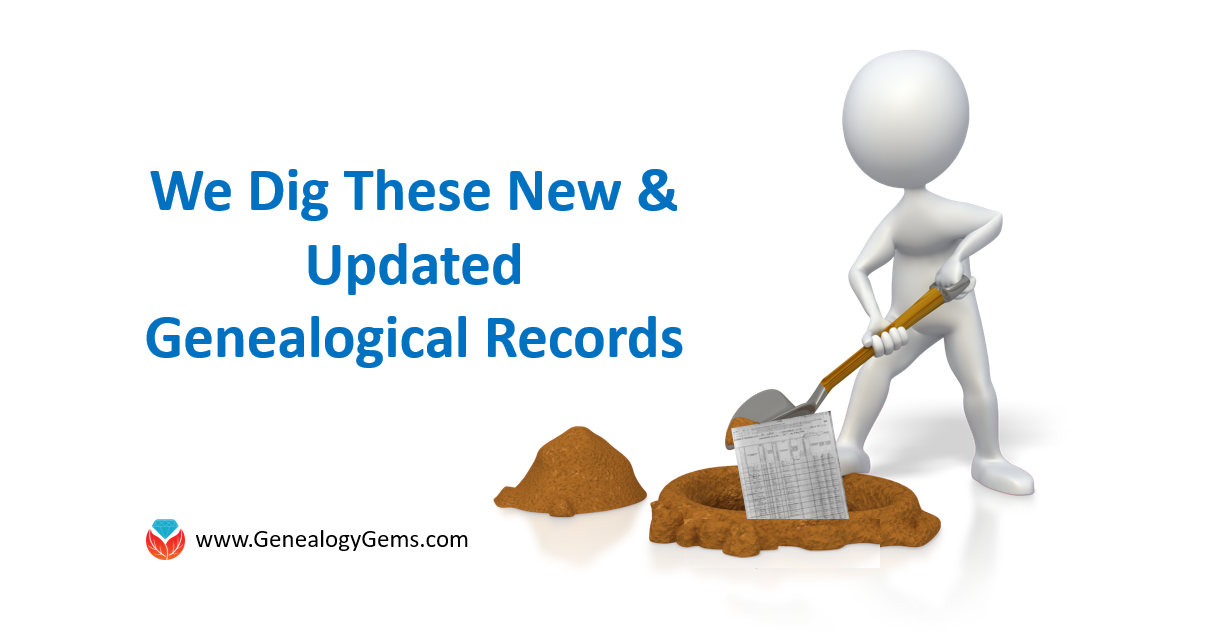
United States and Canada – Transatlantic Migration
First things first: where and when did your early American family arrive in the New World? Findmypast has added a new collection titled United States, Transatlantic Migration. This collection offers more than 30,000 records shedding light on the lives of your migrating ancestors from England, Scotland, Ireland, the Netherlands, Germany, and France from as early as the 1500s to as recent as the 1900s. Some information you may be able to find include: birth countries, date of emigration, ages, occupations, and names of family members. Once you have found where your family settled, head on over to the next record set for founding families.
United States – Colonial Genealogy Records
Findmypast’s colonial genealogy records set titled United States, Early American Families is a one-of-a-kind collection. These records will help you learn even more about your ancestral ties to early founding families in America. Dive into 140 publications containing over 86,000 records. These records provide details regarding the early families and their descendants. You might even learn the birth or death year of your family’s brick wall ancestor!
A sister colonial genealogy records collection titled United States, Early American Vital Records will also be of interest to those searching the colonial American family. This collection is filled with over 14,000 vital records as early as the 1600s! You will be delighted with the many birth, marriage, and death registers, gravestone inscriptions, and wills you can find here.
United States – Connecticut – Town Vitals
The Barbour Collection of Connecticut Town records, also from Findmypast, contains over 18,000 vital record volumes pertaining to Connecticut towns. You will need to search these records by surname. If your ancestral surname is located, you will find a PDF image that may list the birth or death dates, names of family members, and other personal details of the Connecticut family.
United States – Colonial Williamsburg
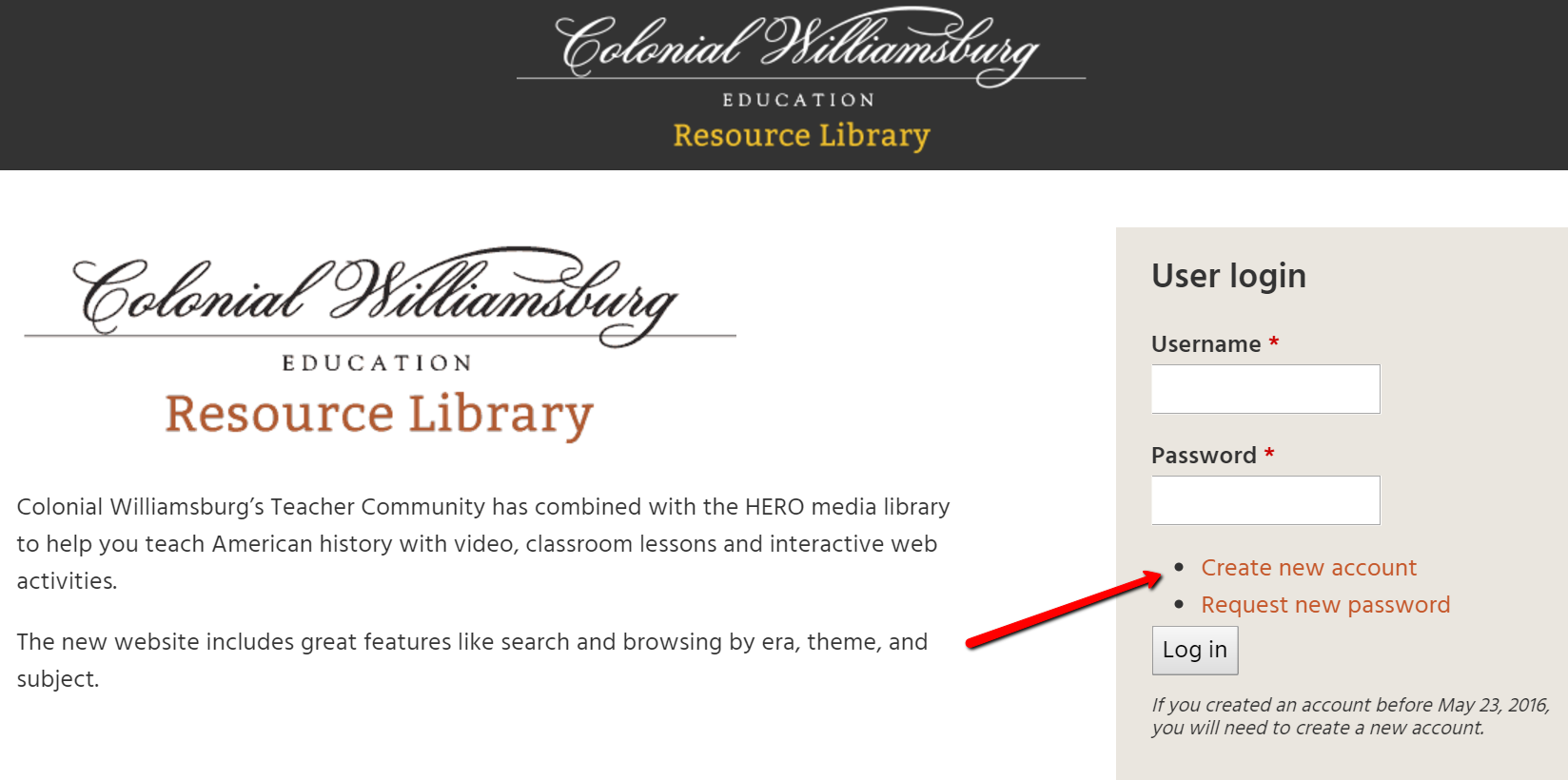
The Colonial Williamsburg Education Resource Library has been made available to everyone with a thirst for learning. What better resource to learn about your colonial American family research than with the library’s more than 100 lesson plans, background texts, and primary source media.
You will need to create an account, but it is free. Even though the account sign-up page seems to be for educators only, it is for everyone! I made my own account and got pretty excited looking through the many videos available. My son, a big history buff, is going to love this! I am always looking for ways to get the kids interested in family history.
United Kingdom – Military
Over 1.1 million War Office records covering officers, nurses, and other ranks have been updated in the British Army Casualty Lists 1939-1945 collection this past week. These lists cover the individuals reported as killed in action, wounded, prisoner of war, missing, died of wounds, dangerously ill, and more.
This collection at Findmypast is fully searchable and offers transcripts and digital images of the original documents. Most lists will give the person’s name, rank, service number, regiment, and status. It may also provide the date of death if applicable.
Denmark – Census
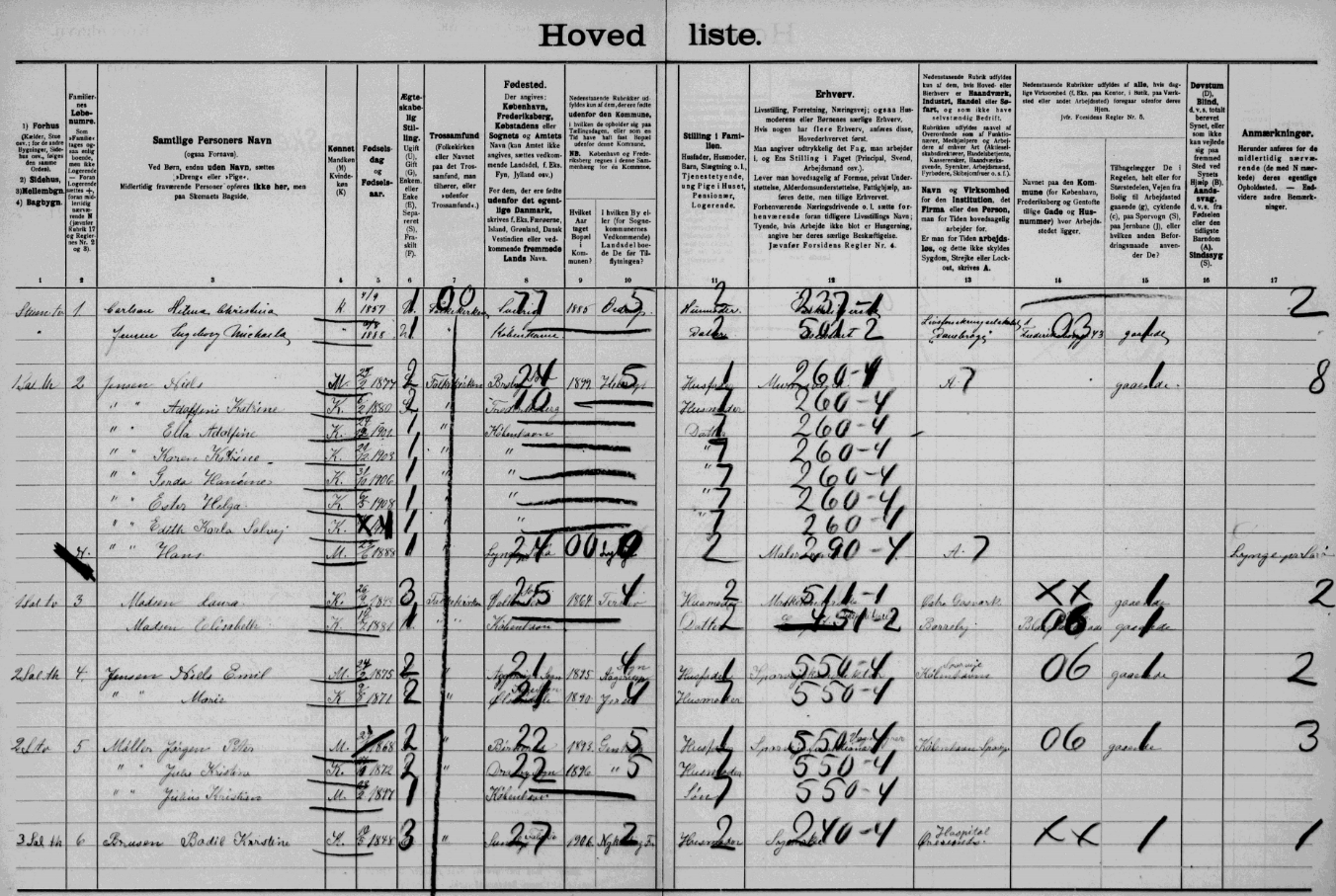
FamilySearch.org is where to look for your Danish ancestors! The name index of the Denmark census taken in 1911 is available for free at FamilySearch or with your paid subscription at MyHeritage.
The Denmark census of 1911 was the thirteenth census for the country. Though the census includes the countries of Greenland, Faroe Islands, and the Danish West Indies, what you will find on FamilySearch is only those enumerations for Denmark. The census is divided into three sections: Copenhagen city, other cities, and rural areas.
This census is written in Danish of course, so you might need a little help with some translation. Pop on over to FamilySearch wiki here to find a helpful chart of key words in both Danish and English.
This census asks questions pertaining to names of household members, birth date and year, birth location, religion, occupation, your means of getting to work, and how long it takes to get to your location of work! Isn’t that interesting?!
More Gems on Colonial American Family Research
Looking for even more tips and tricks to researching the colonial American family? Try these Genealogy Gem favorites!
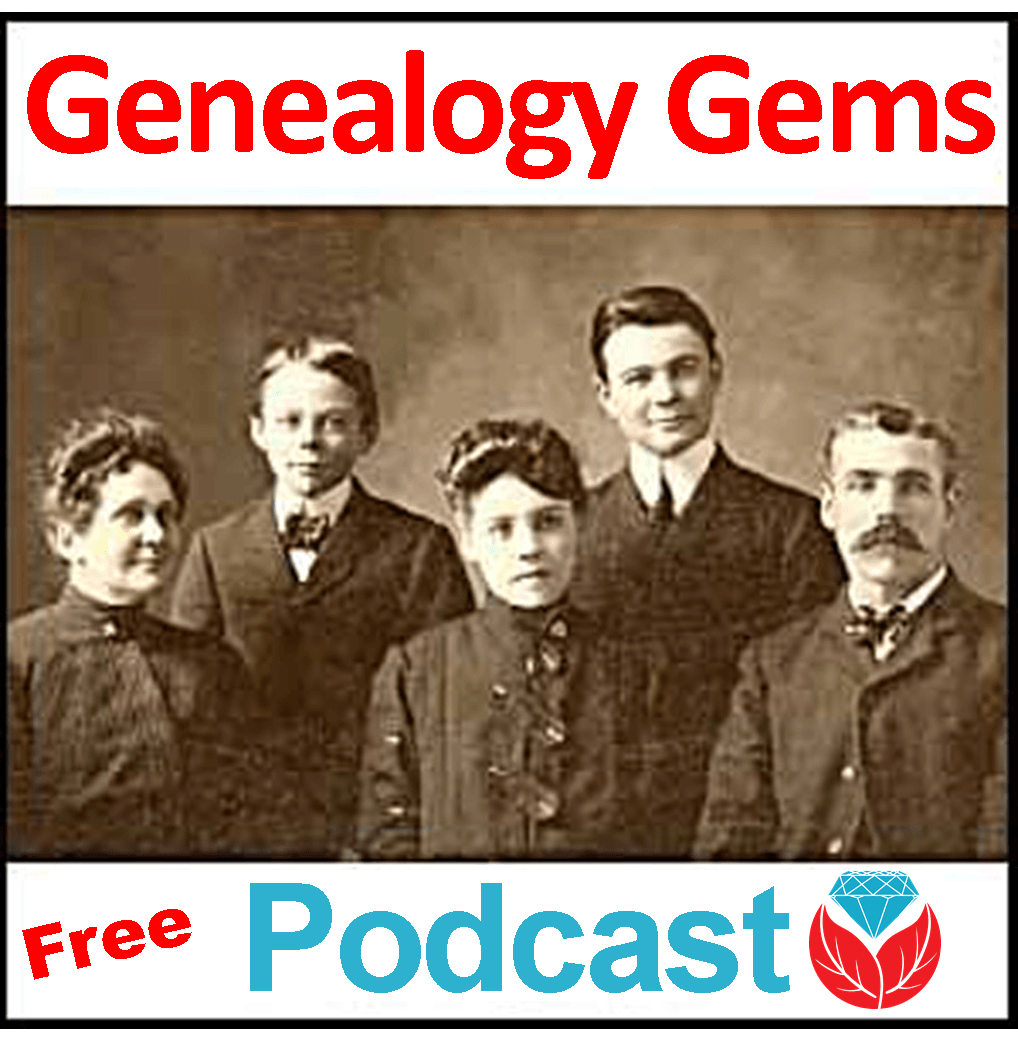 If you haven’t been enjoying The Genealogy Gems (free!) Podcast, try it out today! A podcast is like listening to a favorite radio show from your computer or mobile device. Get up-to-date with everything new and exciting in the world of genealogy, learn a new tech tip, and find inspiration in these wonderful podcast programs!
If you haven’t been enjoying The Genealogy Gems (free!) Podcast, try it out today! A podcast is like listening to a favorite radio show from your computer or mobile device. Get up-to-date with everything new and exciting in the world of genealogy, learn a new tech tip, and find inspiration in these wonderful podcast programs!
Disclosure: This article contains affiliate links and Genealogy Gems will be compensated if you make a purchase after clicking on these links (at no additional cost to you). Thank you for supporting Genealogy Gems!
 Using Evernote for genealogy will make you a more efficient and effective researcher.
Using Evernote for genealogy will make you a more efficient and effective researcher. My laminated reference guide is super handy for every day support! This guide includes:
My laminated reference guide is super handy for every day support! This guide includes: Genealogy Gems website Premium members have a full-year’s access to my popular in-depth video classes, which include The Ultimate Evernote for Genealogy Education video series. This series includes the following full-length and mini-series classes:
Genealogy Gems website Premium members have a full-year’s access to my popular in-depth video classes, which include The Ultimate Evernote for Genealogy Education video series. This series includes the following full-length and mini-series classes:![]() Keep up on all my latest Evernote news and Q&As!
Keep up on all my latest Evernote news and Q&As!

 Probate records detailed the final settling of our ancestors’ financial assets. They often contain rich genealogical information and interesting insights into a person’s life. They are among the many records you might find at courthouses and government archives. More U.S. probate records are coming online (
Probate records detailed the final settling of our ancestors’ financial assets. They often contain rich genealogical information and interesting insights into a person’s life. They are among the many records you might find at courthouses and government archives. More U.S. probate records are coming online (







 If you haven’t been enjoying
If you haven’t been enjoying